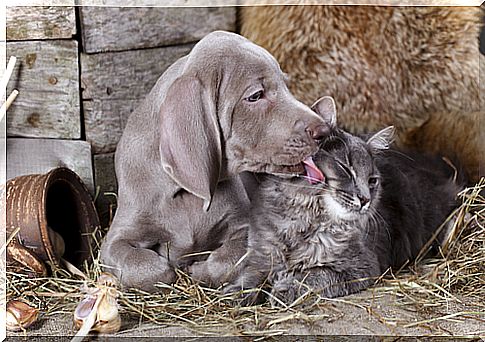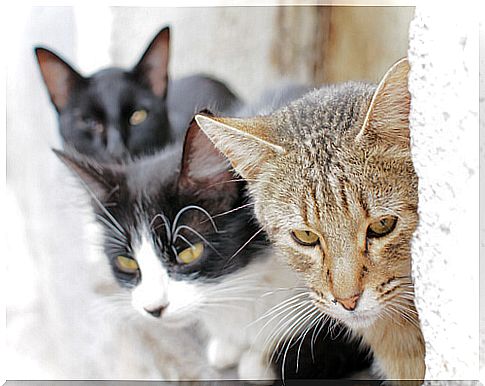A Companion For Your Cat, A Good Idea?

Cats are addictive. Usually when you have one, you don’t want to stop having them. Cats are so interesting, intelligent, and such good company for cat-loving caretakers that they rarely settle for just one. However, there are those who may think that finding a companion for their cat is not the best of ideas. Let’s take a closer look at this.
Through coexistence, people are able to detect their self-sufficient personality and territoriality in cats . Therefore, it is difficult for us to assimilate that they can get along with their peers or with other kinds of animals. However, this is not true at all. Despite these characteristics, cats enjoy the company of other animals, as long as they do not consider them a threat to their territory. In this way they can have a playmate, which is very important especially for those kitties who spend a lot of time alone.
A good way to deal with boredom is to keep our pets busy, and what better way to do that than to give them the affection of another animal. However, this will require patience on your part as the animals establish roles and come to trust each other.
Generally, the relationship of a cat with another animal is initially distant, especially when it comes to adult animals. However, this will only last a few days, while the cat gets used to the presence of the other animal and stops considering it a threat.
The presentation

It is best to wait a few days before officially introducing the animals that will share the same roof. At first you should have them separately. First, because your cat will claim dominance over the territory and you are introducing a stranger. Second, because you must allow your new pet to get used to the space, thus reducing the stress involved in moving to an unfamiliar environment.
Obviously, through its smell and hearing, your cat will know that there is another animal in the house, so ideally, you should wait for its curiosity to diminish a bit. You can help the adaptation process by putting blankets impregnated with the scent of the new pet under the mat or bed on which he sleeps. In this way you will get used to it and associate the smell with things that are pleasant to you.
When you introduce them, let them smell each other if they want to, but you should also let them remain distant in case it happens. If you are introducing a puppy, it is best not to allow it to get too close to the cat, as it may feel threatened and attack in response. Leave them in the same space for a few minutes and continue to prolong these moments as the days go by. This way it will be easier and finally it will be your cat who decides when to approach.
It is better to introduce a puppy than an adult animal, as they tend to be submissive to the veteran. However, this process can also be achieved in adult animals. Of course, try to know the level of aggressiveness of the pet that you are trying to introduce into your home.
Remember that, before all this, you must be calm. This way you can transmit the appropriate energy to your pet and prevent it from misinterpreting your discomfort and associating it with the stranger. You should also show yourself as the alpha all the time, otherwise the veteran cat will tend to misbehave towards the newcomer.
recommendations

- Do not leave the animals alone until you are absolutely sure that they will not be harmed.
- It is better not to neglect small animals. Remember that your cat is a predator and its diet is largely carnivorous.
- Let your cat hide or run away from the other animal. This is absolutely normal behavior.
- Each of the pets should have their own things (toys, bed, dishes).
- Keep in mind the size of your home, as it is better for each one to have their own space.
- Be patient. This is a process that can take a while, but it is better that you do it well to avoid difficulties in the coexistence of both animals.
Cases of special attention
- Little socialized cats
- Animals with a history of aggression
- Too nervous felines
- When to share food or water









